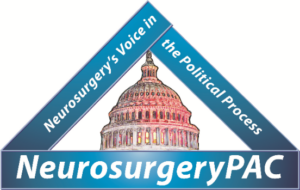“Money is the mother’s milk of politics,” so said Jesse Unruh, speaker of the California Assembly from 1961 to 1968. Like it or not, money is a necessary element of our country’s political system, and political action committees, or PACs, are one mechanism for providing political candidates with the financial support they need to run their campaigns. What’s more, for many critical issues facing neurosurgeons — including streamlining prior authorization, expanding health insurance coverage, medical liability reform, fair reimbursement, graduate medical education financing and biomedical research funding — the road leads through Washington, DC. Given that the decisions made on Capitol Hill have a profound effect on neurosurgical practice, to maximize neurosurgery’s effectiveness in shaping federal public policy, in 2005, the American Association of Neurological Surgeons (AANS) added another tool to its advocacy program — NeurosurgeryPAC. NeurosurgeryPAC is dedicated to advancing the interests of neurological surgeons and their patients by backing candidates for federal office who support neurosurgery’s policy goals.
 Today, political action committees are highly regulated and transparent. Gone are the days and images of the shadowy figure with a suitcase full of cash filling the pockets of unsavory politicians. Driven mainly by the revelations of Watergate, lawmakers in the 1970s passed a series of “good government” bills designed to repair the political process and rejuvenate public confidence in their elected officials. The 1974 amendments to the Federal Election Campaign Act created the Federal Election Commission (FEC) and established candidate contribution limits — $5,000 per election — and new rules and that PACs must follow. The law also required PACs to file periodic campaign finance reports with the FEC, detailing all expenditures and the name, mailing address, occupation and the name of the employer of every individual whose contributions exceed $200 in a calendar year.
Today, political action committees are highly regulated and transparent. Gone are the days and images of the shadowy figure with a suitcase full of cash filling the pockets of unsavory politicians. Driven mainly by the revelations of Watergate, lawmakers in the 1970s passed a series of “good government” bills designed to repair the political process and rejuvenate public confidence in their elected officials. The 1974 amendments to the Federal Election Campaign Act created the Federal Election Commission (FEC) and established candidate contribution limits — $5,000 per election — and new rules and that PACs must follow. The law also required PACs to file periodic campaign finance reports with the FEC, detailing all expenditures and the name, mailing address, occupation and the name of the employer of every individual whose contributions exceed $200 in a calendar year.
Selecting Candidates for NeurosurgeryPAC Support
Upon the inception of NeurosurgeryPAC, the board of directors adopted “Guidelines for Making Political Contributions.” Generally speaking, NeurosurgeryPAC disbursement decisions are guided by the general principle that financial support will only be offered to those candidates who have an interest in promoting the legislative goals and priorities of neurological surgeons, as demonstrated by voting history, bill co-sponsorship, committee assignment, leadership position, relationships with neurosurgeons and recommendations of the NeurosurgeryPAC board of directors. The document includes specific guidance on which candidates are eligible to receive NeurosurgeryPAC support and specifies suggested contribution amounts depending on various criteria, including:
- Congressional leadership position;
- Committee assignment; and
- Whether the candidate is a physician.
To further maximize NeurosurgeryPAC’s effectiveness, contributions are carefully aligned with neurosurgery’s advocacy priorities. Each year, organized neurosurgery establishes its advocacy and health policy agenda, which is developed with the input of our members. The PAC makes its contributions in furtherance of these health policy and legislative priorities and not based on party affiliation. Let me repeat: NeurosurgeryPAC is nonpartisan and contributes to Democrats, Republicans and Independents alike. Furthermore, NeurosurgeryPAC’s candidate contributions must not only align with neurosurgery’s policy agenda but also with our professional and organizational values of integrity, leadership, excellence and professionalism. Given its limited resources, NeurosurgeryPAC must be strategic in how it spends its political dollars, and on average, it contributes to approximately 75 high-value candidates in each 2-year election cycle.
Contributing to NeurosurgeryPAC
NeurosurgeryPAC is an essential element of organized neurosurgery’s advocacy program. It provides our specialty with a mechanism to support and gain access to candidates who share our views on legislation that affects neurosurgeons and our patients. Moreover, it gives neurosurgery political credibility, demonstrating that neurosurgeons and their professional societies are serious participants in the legislative and political process. However, NeurosurgeryPAC cannot meet its annual minimum $250,000 fundraising goal without the necessary financial resources. At the end of the day, we need eligible neurosurgeons and neurosurgical residents to invest in their practice, profession and future by supporting NeurosurgeryPAC.[1]
More Information about NeurosurgeryPAC
More information about NeurosurgeryPAC — including candidates supported by the PAC, a candidate scorecard, donors and information on how to contribute — is available at https://www.aans.org/Advocacy/NeurosurgeryPAC.
NeurosurgeryPAC’s Guidelines for Making Political Contributions
|
As of June 30, NeurosurgeryPAC has contributed to the following candidates for the U.S. Senate and House of Representatives:
| ||||||||
| |||||||||||||||||||||||||||
[1] AANS members who are citizens of the United States and pay dues or have voting privileges may contribute to NeurosurgeryPAC, as may AANS candidate members. All contributions must be drawn on PERSONAL accounts and any corporate contributions to NeurosurgeryPAC will be used for administrative expenses and other activities permissible under federal law. Contributions are not tax-deductible. Federal law requires NeurosurgeryPAC to use its best efforts to collect and report the name, mailing address, occupation, and the name of the employer of every individual whose contributions exceed $200 in a calendar year.








